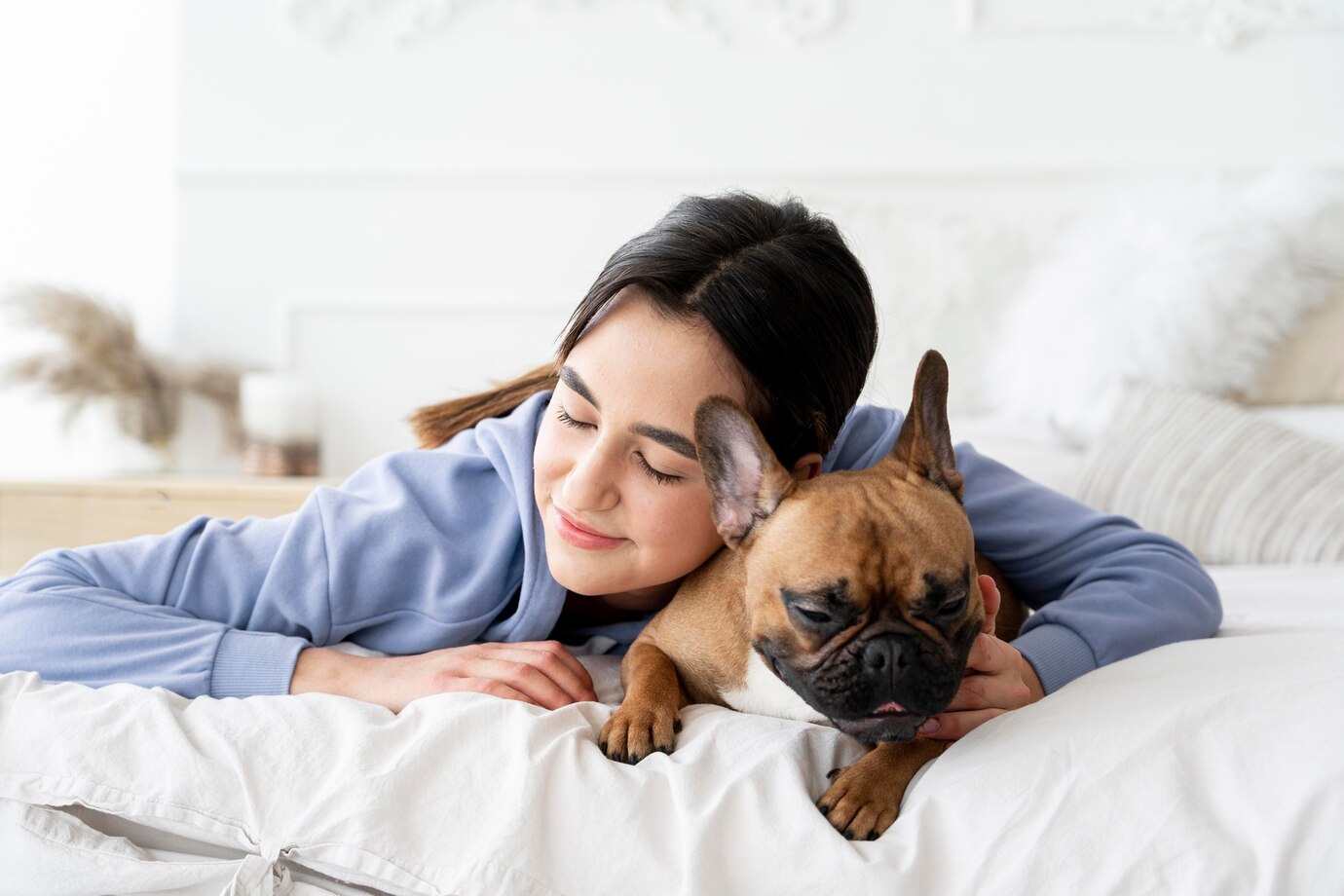Dogs whimper in their sleep due to dreams or subconscious processing. This behavior mirrors human REM sleep activity.
Dogs, like humans, experience different sleep cycles, including REM (Rapid Eye Movement) sleep. During REM sleep, dogs often dream, which can lead to whimpering, twitching, or even barking. This stage is crucial for mental and emotional health, allowing dogs to process daily experiences.
Whimpering during sleep is a normal part of this process and usually nothing to worry about. Understanding this behavior can help pet owners ensure their dogs have a restful and healthy sleep environment. Providing a comfortable bed and a quiet, safe space can contribute to better sleep quality for your furry friend.
Introduction To Canine Sleep Behaviors
Dogs have unique sleep patterns. They sleep more than humans. Dogs can sleep up to 14 hours a day. Puppies and older dogs sleep even more. They enter a deep sleep cycle called REM. This is when they might whimper or twitch. Dogs also have light sleep cycles. They wake up easily during light sleep.
Dogs make sounds in their sleep. Whimpering is one of these sounds. Dogs may also bark or growl. These sounds are normal. They are often dreaming. Whimpering can be due to dreams. It can also mean they are uncomfortable. Make sure their bed is cozy. Check for any health issues if the sounds are frequent.
Understanding Dog Whimpering
Dogs may whimper because they are dreaming. They could be having a happy dream or a scary one. Pain or discomfort might also cause whimpering. Some dogs whimper to communicate their needs.
Whimpering usually happens during the Rapid Eye Movement (REM) sleep stage. This is when dogs dream the most. Your dog might whimper more if they had an active day. Puppies and older dogs whimper more often in their sleep.
The Science Behind Dog Sleep
Dogs have sleep stages like humans. They experience Rapid Eye Movement (REM) and non-REM sleep. During REM sleep, dogs often dream. Their bodies may move while they sleep. Non-REM sleep is more restful and deep. Dogs need both stages to stay healthy.
Dog brains are very active during sleep. In REM sleep, their brains work like they are awake. This brain activity causes dreaming. Dogs might whimper or move due to these dreams. Their brain activity is less in non-REM sleep. This stage helps them rest and recover.
Emotional Factors
Dogs can have dreams just like people. They might dream about playing or running. Sometimes, they might have nightmares too. These dreams and nightmares can cause them to whimper. It is a normal part of their sleep cycle.
Stress and anxiety can also make dogs whimper in their sleep. They might feel stressed due to a new environment or loud noises. Anxiety can come from separation or changes in their routine. Whimpering helps them to release some of this stress while they sleep.
Physical Causes
Dogs may whimper in their sleep due to physical discomfort or pain. Conditions like arthritis or injury can cause nocturnal distress. Regular vet check-ups help identify and manage these issues.
Pain And Discomfort
Dogs might whimper in their sleep due to pain. Injuries or arthritis can cause this. Older dogs often suffer from joint pain. This discomfort can lead to whimpering. Muscle aches are another cause. Dogs can pull muscles during play. They might feel sore afterward. Dental issues also cause pain. A bad tooth can hurt even when resting. Dogs might whimper if their bed is uncomfortable. A hard bed can cause pressure points. Soft beds support their joints better. Ensuring a comfortable sleeping area is crucial.
Health Issues
Health problems can make dogs whimper. Digestive issues are common. Dogs might have a stomach ache. Bloating can cause discomfort. Dogs might cry out in their sleep. Respiratory problems affect breathing. Dogs can have trouble getting enough air. This can lead to whimpering. Infections can also cause pain. Ear infections are a common issue. They can be very painful. Dogs might whimper if they have an infection. Regular vet check-ups help detect these problems.
Behavioral Indicators
Dogs often show signs of dreaming. Their legs may twitch or move. This can look like they are running. You might see their ears twitch too. Some dogs move their eyes rapidly under their lids. This is called REM sleep. It’s a sign of deep sleep. During this stage, dogs might also whimper.
Whimpering is not the only sound dogs make. They might also bark softly. Sometimes, dogs growl in their sleep. These sounds can be part of their dreams. Puppies and older dogs might whimper more often. They tend to have more vivid dreams. These vocalizations are usually harmless.
When To Worry
Dogs whimper in their sleep due to dreams, but frequent or intense whimpering may signal discomfort or health issues. Pay close attention if your pet appears restless or shows signs of distress. Consulting a vet can provide peace of mind and ensure your dog’s well-being.
Signs Of Trouble
Dogs usually whimper in sleep due to dreams. But sometimes it can be a sign of trouble. Frequent whimpering may mean your dog is in pain. Look for additional signs like shivering or restlessness. Sudden changes in sleep patterns can also be a red flag. Behavioral changes during the day are important too. Is your dog eating less or acting sad? These signs mean it’s time to pay attention.
Consulting A Veterinarian
Professional advice is vital if your dog shows signs of trouble. A vet can rule out medical issues. They may check for pain or anxiety. Regular check-ups can help spot issues early. Early treatment can prevent serious problems. Never hesitate to ask your vet about your dog’s sleep habits. Peace of mind is worth it.
Helping Your Dog
Ensure your dog has a soft and cozy bed. Place the bed in a quiet and dark area. A calm environment helps your dog sleep better. Try to keep the temperature comfortable. Dogs can be sensitive to heat and cold. Use blankets if needed.
Anxiety and stress can cause dogs to whimper in sleep. Provide regular exercise to help reduce stress. Play with your dog daily. Mental stimulation is also important. Puzzle toys can keep their mind active. Consistent routines help dogs feel secure. Try to avoid sudden changes.
Another Post: Do Australian Sheep Dogs Shed
FAQuestions
Why Do Dogs Cry While Sleeping?
Dogs may cry due to dreaming. They experience REM sleep, which can trigger emotions and movements.
Is It Normal For Dogs To Whimper?
Yes, it’s normal. Dogs often dream and express emotions through vocalizations like whimpering.
Should I Wake My Dog If It Whimpers?
No, let your dog sleep. Waking them can disrupt their sleep cycle and cause confusion.
Conclusion
Understanding why dogs whimper in their sleep can bring peace of mind to pet owners. It often relates to dreams or minor discomfort. Observing your dog’s sleep patterns helps identify any issues. Always consult a vet if concerned. Ensuring your dog’s comfort and health during sleep is crucial for their well-being.

